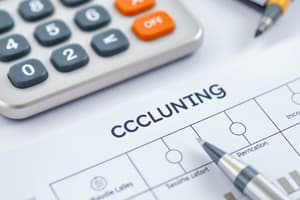Podcast
Questions and Answers
A business has total assets of $500,000 and total liabilities of $200,000. If the business owner invests an additional $50,000 into the business, what is the new net worth of the business?
A business has total assets of $500,000 and total liabilities of $200,000. If the business owner invests an additional $50,000 into the business, what is the new net worth of the business?
- $800,000
- $350,000 (correct)
- $300,000
- $250,000
Which sequence accurately reflects the accounting cycle?
Which sequence accurately reflects the accounting cycle?
- Source Documents, Journalizing, Posting, Trial Balance, Financial Statements (correct)
- Posting, Journalizing, Source Documents, Financial Statements, Trial Balance
- Source Documents, Trial Balance, Journalizing, Posting, Financial Statements
- Journalizing, Posting, Trial Balance, Financial Statements, Source Documents
Which of the following accounts would be classified as a current asset?
Which of the following accounts would be classified as a current asset?
- Cash (correct)
- Accounts Payable
- Land
- Equipment
A company purchases office supplies with cash. Which source document would typically be used to verify this transaction?
A company purchases office supplies with cash. Which source document would typically be used to verify this transaction?
A business owner withdraws cash from the business for personal use. Which account is used to record this transaction?
A business owner withdraws cash from the business for personal use. Which account is used to record this transaction?
Flashcards
Net Worth
Net Worth
Assets minus liabilities; represents the owner's stake in the business.
Accounting Cycle
Accounting Cycle
The series of steps to record and summarize accounting data, from initial transaction to financial statements.
Source Documents
Source Documents
Original records of transactions (e.g., receipts, invoices) that provide evidence and details of business activities.
Capital
Capital
Signup and view all the flashcards
Drawings
Drawings
Signup and view all the flashcards
Study Notes
- EMS - Accounting Formal Assessment 1 for Grade 9
- Total marks: 50
- Date: 10 February 2025
- Examiner: Ms. S Smit
- Moderator: Ms. Stemmet
Terminology and the accounting cycle
- Lesson 1 is on Net worth and Accounting Cycle
- Know how to calculate Net Worth
- Be able to complete the Accounting Cycle
- An understanding of source documents use for different transactions is needed
- Knowledge of different journals for different transactions advised
- Lesson 2 is on Account classification
- Important to define different accounts
- Accounts to define: Capital, Drawings, Non-current assets and Current assets, Non-current liabilities and current liabilities, Income, and Expenses
Bank accounts and source documents
- Lesson 1 is on Bank accounts
- One must interpret a bank statement
- Lesson 2 is on Source documents
- Need to interpret a receipt and an EFT payment authorization
- Revise all activities in the textbook
Studying That Suits You
Use AI to generate personalized quizzes and flashcards to suit your learning preferences.




